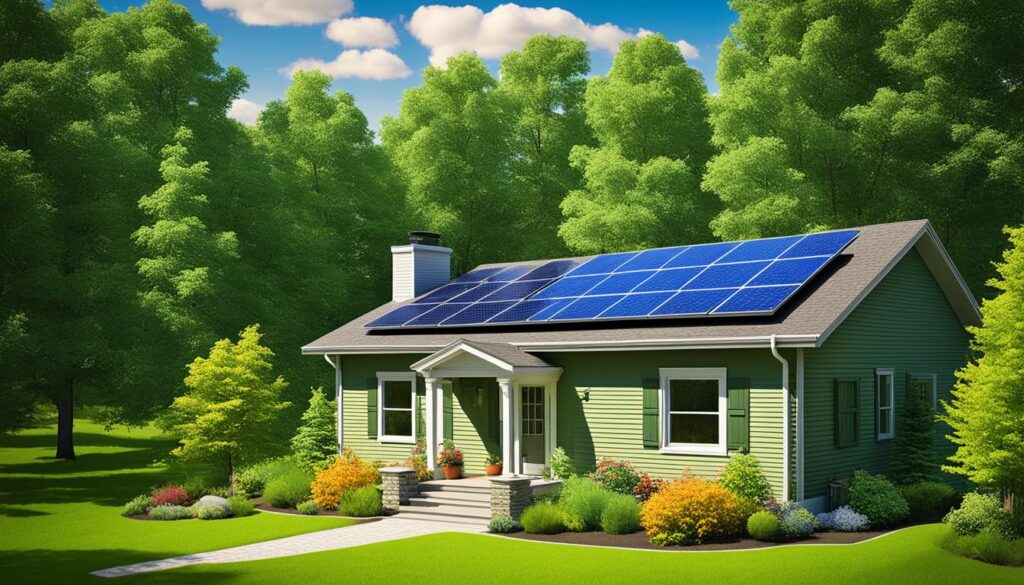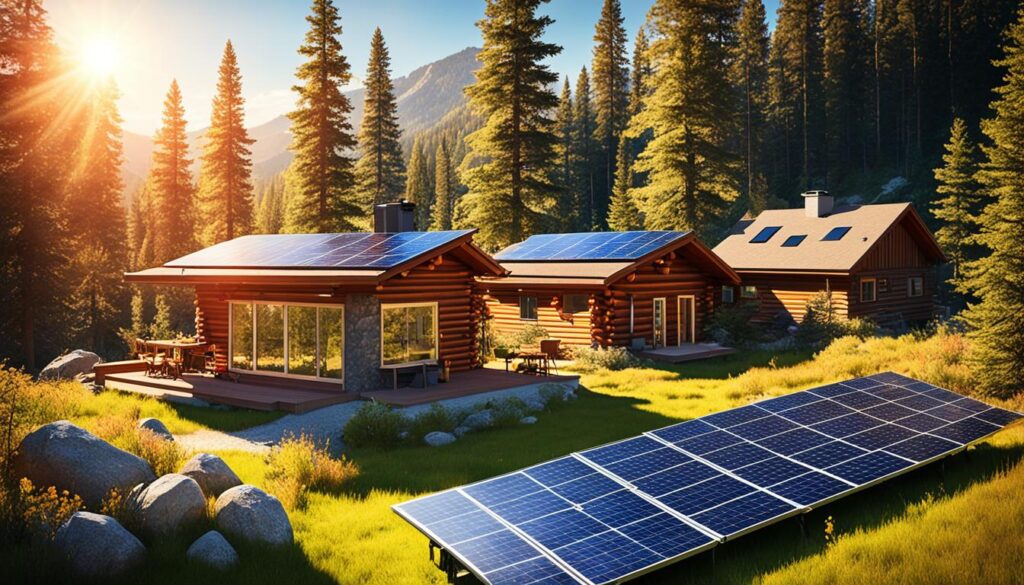Living off the grid has become increasingly popular as individuals seek sustainable energy solutions. One of the most effective and reliable options for off-grid living is an off grid solar system. By harnessing the power of the sun, these systems provide renewable energy that allows individuals to live self-sufficiently, even in areas without access to conventional power grids.
An off-grid solar consists of solar panels that capture sunlight and convert it into electricity. This electricity is then stored in battery banks for later use or converted to AC power through inverters to power household appliances. By generating and storing their own electricity, individuals can reduce their reliance on fossil fuels, lower their electricity bills, and minimize their carbon footprint.
Designing and planning an off-grid solar system requires careful consideration of factors such as energy consumption needs, geographical location, available space, and system reliability. By evaluating these factors, individuals can optimize their off-grid solar system to meet their specific requirements and ensure long-term efficiency and effectiveness.
Key Takeaways:
- Offgrid solar system offer sustainable energy solutions for off-grid living.
- Solar panels capture sunlight and convert it into electricity for self-sufficiency.
- Battery banks store excess energy for use during low sunlight or at night.
- Inverters convert DC electricity to AC power for household appliances.
- Planning an off-grid solar system involves considering energy needs, location, space, and reliability.
Essential Components of an Off Grid Solar System
When it comes to off-grid solar systems, there are several essential components that work together to provide a reliable and sustainable source of power. These components include:
The Core of Off-Grid Energy: Solar Panels
Solar panels are the heart of any off-grid solar system. These panels capture sunlight and convert it into electricity through the photovoltaic effect. The electricity generated by the solar panels can then be stored for later use or used immediately to power electrical appliances in your home.
Regulating Power: Charge Controllers
Charge controllers play a crucial role in an off grid solar system. They regulate the remote solar power flow from the solar panels to the battery banks, ensuring that the batteries are charged optimally and preventing overcharging. Charge controllers help maximize the efficiency and lifespan of the battery banks, ultimately ensuring a steady and reliable power supply.
Power Conversion: Inverters
Power inverters are responsible for converting the direct current (DC) electricity generated by the solar panels into alternating current (AC) electricity. AC electricity is the standard form of electricity used in most household appliances and electronics. Inverters enable you to power your household appliances directly from the solar-generated electricity, making it possible to enjoy all the comforts of a conventional power grid even when living off the grid.
Storing Energy: Battery Banks
Battery banks are an essential component of an off grid power systems as they store the excess energy generated by the solar panels. These batteries allow you to have a continuous power supply during periods of low sunlight or at night when the solar panels are not generating electricity. Battery banks enable you to maximize your energy independence and ensure you have a reliable source of power regardless of the weather conditions.
| Component | Description |
|---|---|
| Solar Panels | Convert sunlight into electricity |
| Charge Controllers | Regulate power flow and prevent overcharging |
| Power Inverters | Convert DC electricity into AC electricity |
| Battery Banks | Store excess energy for use during low sunlight or at night |
Planning and Designing Your Off Grid Solar System
When it comes to planning and designing an off-grid solar system, several factors need careful consideration. By taking into account these important elements, you can ensure the efficiency, reliability, and long-term success of your system.
Determining Energy Consumption Needs
One of the first steps in planning your off grid solar setup is determining your energy consumption needs. This will help you determine the appropriate size of the system and the number of solar panels required to meet your electricity demands. Consider your daily energy usage, including appliances, lighting, and other devices, to accurately assess your requirements.
Considering Geographical Location
Your geographical location plays a vital role in the success of your off-grid solar system. Different regions receive varying amounts of solar insolation, which is the amount of sunlight incident per unit area. Understanding the solar insolation specific to your location will help determine the energy generation potential of your system. Areas with higher solar insolation will generally produce more energy.
Evaluating Available Space
Another crucial aspect in the planning process is evaluating the available space for solar panel installation. Take into account factors such as roof slope, orientation, and shading from trees or other structures. Maximizing the available space will ensure optimal solar panel placement and energy generation. Additionally, consider any future expansion plans or the possibility of adding more panels over time.
Prioritizing System Reliability
System reliability is key when designing an off-grid solar system. Opt for high-quality components that are built to withstand the demands of off-grid living. Each component, from the solar panels and charge controllers to the inverters and battery banks, should be chosen with reliability and durability in mind. Regular maintenance and check-ups are also essential to keep your system operating efficiently and to prolong its lifespan.
By carefully considering your energy consumption needs, geographical location, available space, and system reliability, you can design an off-grid solar system that meets your requirements and provides sustainable energy for years to come.

Off Grid Solar Panel Setup
The goal of an off-grid solar panel setup is to run entirely off the national electricity grid. An inverter, charge controllers, solar panels, and a battery storage device are the standard components of this kind of system. Direct current (DC) power is produced by solar panels using sunlight, and it is subsequently stored in batteries for later use. The DC electricity is stored and then transformed by the inverter into AC, or alternating current, which powers household equipment.
You can run your farm, business, or residence with this configuration without depending on outside electricity sources. For those who reside in isolated regions or areas with unstable grid connectivity, an off-grid solution provides unparalleled autonomy and tranquilly.
Conclusion
Embracing Energy Independence with Off Grid Solar
Transitioning to an off-grid solar system offers individuals the opportunity to achieve energy independence and reduce their reliance on traditional power sources. By generating electricity from the sun, off-grid solar systems provide a sustainable and greener alternative. Not only does this lead to cost savings, but it also contributes to a cleaner and more sustainable future.
The Environmental Impact of Choosing Renewable Energy
Opting for off-grid solar systems has a positive environmental impact. By harnessing the power of the sun, these systems reduce carbon emissions and decrease reliance on fossil fuels. This shift towards renewable energy sources helps combat climate change, protects the environment, and preserves natural resources.
The Financial Implications and Long-term Benefits
Investing in an off-grid solar system brings long-term financial benefits. Lowered energy bills and potential incentives and savings make it an attractive option. Over time, users can recoup their initial investment while enjoying sustainable and cost-effective energy solutions. Additionally, off-grid solar systems provide stability against rising energy costs, making them a reliable and financially prudent choice.
By choosing an off-grid solar system, individuals can enjoy energy independence, reduce their carbon footprint, and achieve long-term financial savings. Embracing renewable energy is not only an investment in a sustainable future, but it also empowers individuals to take charge of their energy consumption and contribute to a greener world.
FAQ
What is an off-grid solar system?
An off-grid solar system is a sustainable energy solution that allows individuals to live off the grid, even in areas where traditional power grids are unavailable. It harnesses solar energy through solar panels to generate and store electricity for later use.
What are the benefits of adopting an off-grid solar system?
Adopting an off-grid solar system offers numerous benefits, including reduced reliance on fossil fuels, lower electricity bills, and reduced carbon emissions. It also provides energy independence and the opportunity to live sustainably.
What are the essential components of an off-grid solar system?
The core components of an off-grid solar system include solar panels, charge controllers, power inverters, and battery banks. Solar panels capture sunlight and convert it into electricity, charge controllers regulate the power flow, power inverters convert the electricity into a usable form, and battery banks store excess energy for later use.
How do solar panels work in an off-grid solar system?
Solar panels capture sunlight and convert it into electricity through a process called the photovoltaic effect. The panels contain photovoltaic cells that generate a direct current (DC) when exposed to sunlight. This DC electricity is then converted into alternating current (AC) to power household appliances.
What is the role of charge controllers in an off-grid solar system?
Charge controllers regulate the power flow from the solar panels to the battery banks in an off-grid solar system. They ensure optimal charging of the batteries and prevent overcharging, which can damage the batteries. Charge controllers also help extend the lifespan of the batteries.
How do power inverters work in an off-grid solar system?
Power inverters convert the DC electricity generated by the solar panels into AC electricity, which is the type of electricity used to power household appliances. They allow the electricity produced by the solar panels to be compatible with the appliances and electrical systems in the off-grid living space.
What is the purpose of battery banks in an off-grid solar system?
Battery banks store excess energy generated by the solar panels during sunny periods for use during times of low sunlight or at night. They act as a backup power source, ensuring a continuous supply of electricity even when the solar panels are not producing enough energy.
What factors should be considered when planning and designing an off-grid solar system?
Several factors should be considered when planning and designing an off-grid solar system. These include determining your energy consumption needs, considering the geographical location and solar insolation, assessing available space for solar panel installation, and ensuring system reliability through high-quality components and regular maintenance.
What are the advantages of embracing energy independence with an off-grid solar system?
Embracing energy independence through an off-grid solar system allows individuals to become self-sufficient and reduce their reliance on traditional energy sources. This provides cost savings, contributes to a greener and more sustainable future, and offers the opportunity for a more resilient and independent lifestyle.
What is the environmental impact of choosing renewable energy through off-grid solar systems?
Choosing renewable energy through off-grid solar systems has a positive environmental impact. It reduces carbon emissions and helps to mitigate climate change by reducing reliance on fossil fuels, which are major contributors to greenhouse gas emissions. By using clean and renewable energy from the sun, individuals can contribute to a cleaner and healthier environment.
What are the financial implications and long-term benefits of off-grid solar systems?
Off-grid solar systems offer long-term financial benefits. They can significantly lower electricity bills, especially in areas with high electricity rates. There may also be potential incentives and savings from government programs or initiatives promoting renewable energy. Additionally, off-grid solar systems are a smart investment that can increase property value and provide a return on investment over time.

